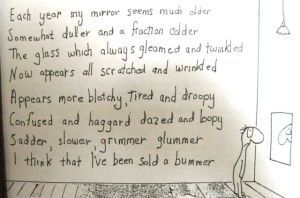The Ineffability of Aging
 No so long ago, I viewed 70 as the beginning of “old age.”
No so long ago, I viewed 70 as the beginning of “old age.”
Trouble is that today—my 70th birthday—I don’t feel old. Yes, I have grey hair, along with wrinkles in some places I would never mention in polite society. I do get annoying muscle cramps more often than I would like. But I can climb six flights of stairs several times a day, and the body that I see in the mirror looks a whole lot better than it did when I was 18. I have fewer aches and pains today than I did at age 50, a combination of eating better and getting more exercise. And good genes certainly don’t hurt.
Statistics tell me that I could live another 10-15 years; given my health and genes, it could be easily be another 30 (my mother lived to 90; I have countless friends with parents approaching 100). I’ve been encouraged by several articles I read of late, including a recent editorial in the New York Times by David Brooks, that report on the “U-Curve,”–the pattern of changing levels of emotional satisfaction over the course of life. Statistics on the U-curve suggest that happiness/ contentment declines from childhood to about age 50, and then trends upward more or less steadily. Given my own emotional pattern over the decades, I should be bordering on ecstasy by 100.
But do I really want to live another 30 years?
An interesting approach to the question of aging comes from physician, academician and bio-ethicist Ezekiel Emmanuel. In a recent article in the Atlantic Monthly, he coined the term “American immortal”—what he calls the obsession “with exercising, doing mental puzzles, consuming various juice and protein concoctions, sticking to strict diets, and popping vitamins and supplements, all in a valiant effort to cheat death and prolong life as long as possible.” You can add to his list, of course, all of the various medical interventions—mechanical, surgical and pharmaceutical—that we use to mask the reality of our inevitable aging and mortality.
Emmanuel has concluded that he would prefer to die at age 75. In his view, that is plenty long enough to have lived a full and rich life with a satisfying career, a good marriage and a thriving family, including grandchildren.
It seems at first, to be a curious position for someone who opposes suicide, assisted or otherwise. But his argument is not that he refuses to live beyond 75. Rather, he has decided that as he approaches 75, he will cease taking pro-active steps to retard aging or prolong his life. No flu shots, vitamins, or anti-biotics. No screening exams. No surgical or mechanical (e.g., a pacemaker) interventions. No chemotherapy. No drugs (e.g., statins or blood pressure meds) to keep his bodily functions performing as if he was still young.
The only medical treatment he will consider is palliative care, if he needs it to keep him comfortable toward the end. In his words, “I will die when whatever comes first takes me.” This is, of course, what mankind has done for thousands of years … until medical technology took over the management of aging and death in the mid-1900’s.
I find his argument compelling, although I’m not sure 75 is the age I’d choose. Perhaps 80 or 85.
And I also find myself pondering the boundaries of palliative care. Shouldn’t it include the repair—surgical, pharmaceutical or mechanical— of traumatic events that diminish the quality of life but will not kill you? A broken arm or leg? A case of poison ivy. A hernia. And what about diet and exercise? Eating properly is own reward, just in how you feel, regardless of its long-term benefits for your health. Similarly, exercise stimulates brain chemicals that make you feel better, mentally and physically. Should I stop doing it simply because it has the age defying-ability to preserve muscle tone and bone density?
What would you do?
P.S. Emmanuel explicitly reserves the right to change his mind at any point along the way!
The post The Ineffability of Aging appeared first on Mary Gottschalk - Author.



